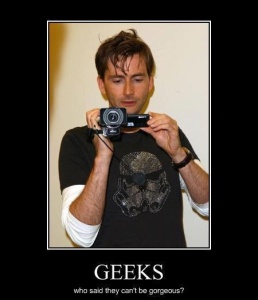We are not angels, we are merely sophisticated apes. Yet we feel like angels trapped inside the bodies of beasts, craving transcendence and all the time trying to spread our wings and fly off, and it’s really a very odd predicament to be in, if you think about it. ~ Vilayanur S. Ramachandran
I talk a lot on this blog about the importance of considering the reader. The word ‘reader’ is my third most used tag, after ‘writing’ and ‘characterisation’. I’m entirely comfortable with that balance. One thing that I haven’t covered before, however, is the difference between a reader of commercial fiction and a reader of genre fiction. And no, I’m not referring to the stereotype of geek. I think we’ve moved well past that, as a sub-culture. Besides, David Tennant is a geek.
Abeyance
Aaaanyway, the point is that those with experience of reading genre fiction have different expectations to those who don’t. Most of that is connected to something that Orson Scott Card (yes, him again) calls abeyance. That is, holding explanations of unusual ideas / words / things back to avoid info-dumping, and letting the reader either try to draw their own conclusions or trust that an explanation will be forthcoming later.
Experienced sf readers recognise that they don’t know what a womble spoon is, and that the author doesn’t expect them to know… But an inexperienced sf reader thinks that the author expects them to already know, and stops cold… He is just as likely to think that either the writer is so clumsy that she doesn’t know how to communicate well, or that this novel is so esoteric that its readers are expected to know uncommon terms that aren’t even in the dictionary. ~ OSC, HtwSF&F
Of course you can’t stop and explain every weird term and 7-legged animal that crops up. It would stop the narrative flow dead in its tracks. Plus there’s the added challenge of giving organic explanations – if your viewpoint character is a native they aren’t going to start explaining the migratory habits of the Lesser Spotted Ewok to themselves. So the only reason to give that explanation is if a character who wouldn’t be expected to know – and has a reason to want to – were to ask. Genre readers understand this and are willing to wait, because they’re trained to expect that style. For commercial fiction readers who haven’t come across it before, it can be what those in the business world call ‘a barrier to entry’.
Implication
Building on that idea, because the genre reader is used to not having explanations handed to them on a silver platter, they are also trained to (sub)consciously extrapolate meaning from what context is available. This is where it pays not to patronise or underestimate your reader’s intelligence. Speaking as a reader, there’s a certain amount of justifiable smugness that comes from working stuff out for yourself. As a result of that training, a genre reader is likely to pick up on way more subtext, which means that you can build more subtext in. That brings its own challenges, of course – if the physics or culture is inconsistent, this is the audience that will notice. And care. Seriously, go on any fandom forum. So much caring.
Literalism
Another potential pitfall, this one. Genre readers are very accepting of the weird and wonderful. To give the same example as OSC (because I can’t think of a better one), if you call something a ‘reptile bus’, genre readers are quite likely to assume you mean an actual giant lizard. Those who read commercial fiction, on the other hand, spot the metaphor and imagine something like a London bendy-bus that moves in a snake-like fashion.
The way to avoid potential issues is to avoid metaphors early on, until the rules of your setting have been established. Similes and analogies are fine, though. Make sure you know the difference!
Also, as a final point, try to avoid metaphors (and similes and analogies) which pull the reader out of the setting. Don’t refer to the Golden Arches, for example, unless MacDonalds is contemporary with the setting and timeline of the story. Stick to drawing parallels with things your viewpoint character would be familiar with. That actively adds to the world-building, rather than hauling your reader out of it. Remember, this audience is very flexible and intelligent. Take advantage of that.
The rest of How to write Science Fiction & Fantasy is about the business of getting published. I may share that or I may not, depending on what OSC says about it. The publishing world has moved on a bit since this was published in 1990 so a lot of it probably won’t be relevant.
The alternative is to go into his rules on world-building for next week’s blog. I felt that a lot of what he said there was reasonably straight-forward but I’ll bow to the demands of the reader. If you guys want to hear it, shout now!


Your explanations and evaluation of aspects OSCs book are much more interesting and informative than reading my own copy has ever been. Thank you.
Delighted to be of assistance!
Thank you so much for that explanation of abeyance. I’ve known about this for many years, but I didn’t have a term for it, much less an easy way to explain it to other people. (“migratory habits of the Lesser Spotted Ewok” – 🙂 )
Abeyance is one of the most useful things I learned from OSC’s book, and it’s a very useful book. One of the things I like about it is that it acknowledges the role of the reader, and that how they’ll receive a story isn’t just about the writer and how good or bad the writing is. You have to bear in mind different sorts of readers and what they get from books. I like the feeling of working out what’s hinted at, and so have limited patience for extending exposition, but that doesn’t mean that such exposition is necessarily bad writing.
Pingback: This weekend I will mostly be reading… | Andrew Knighton writes
Pingback: Exposition – Skill and Taste | Andrew Knighton writes